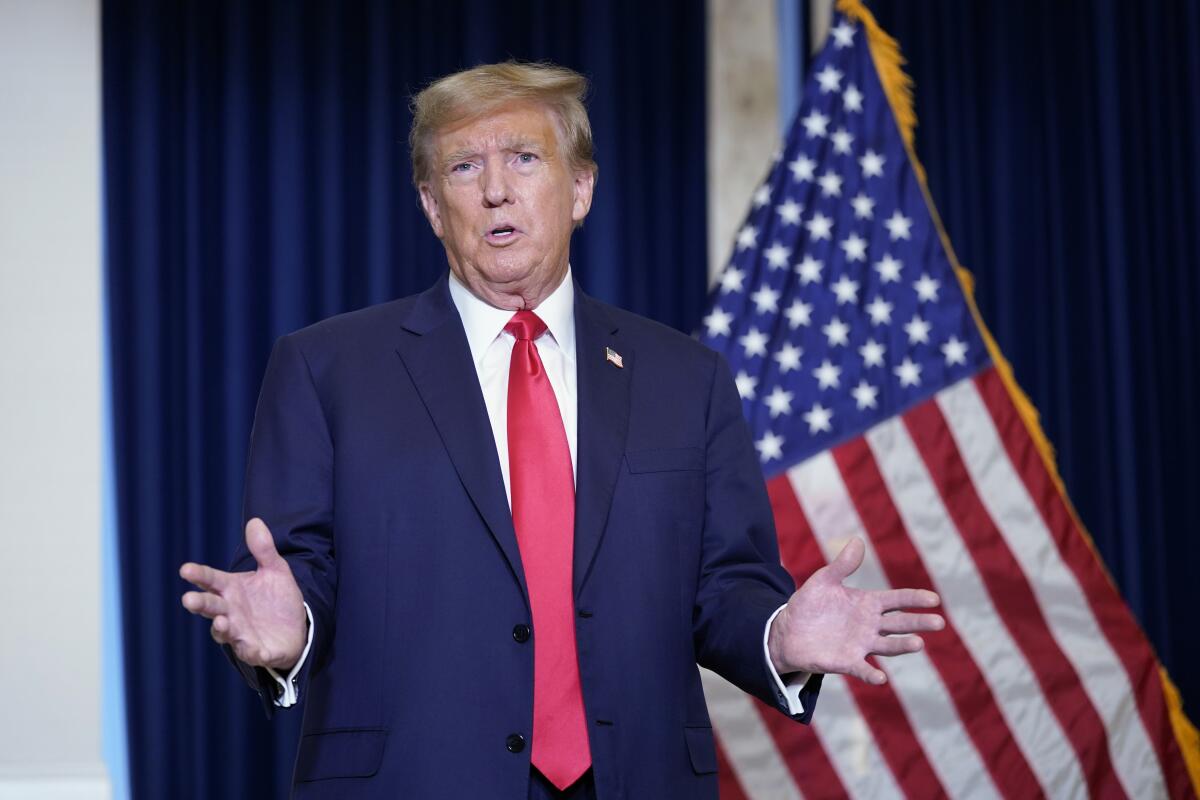Trump won’t make his own closing arguments after his lawyers refuse to agree to judge’s restrictions

- Share via
NEW YORK — Former President Trump won’t make his own closing argument in his New York civil business fraud trial after his lawyers objected to the judge’s insistence that the former president stick to “relevant” matters.
Judge Arthur Engoron rescinded permission on Wednesday, a day ahead of closing arguments in the trial.
The trial could cost Trump hundreds of millions of dollars in penalties and strip him of his ability to do business in New York. His lawyers had signaled that he planned to take the extraordinary step of delivering a summation personally, in addition to arguments from his legal team.
Trump is a defendant in the case, brought by New York Atty. Gen. Letitia James. She claimed his net worth was fraudulently inflated by billions of dollars on financial statements that helped him secure business loans and insurance.
Engoron has already found Trump and his company liable for fraud in the case, but the amount of the penalty is yet to be determined.
The former president and leading candidate in polling for the GOP nomination denies any wrongdoing, and he has called the case a “hoax” and a political attack on him. Trump is a Republican; James and Engoran are Democrats.
It’s extremely unusual for people who have lawyers to give their own closing arguments. In a recent email exchange that was filed in court Wednesday, Engoron initially approved the unusual request, saying he was inclined “to let everyone have his or her say.”
But he said Trump would have to limit his remarks to the boundaries that cover attorneys’ closing arguments: “commentary on the relevant, material facts that are in evidence, and application of the relevant law to those facts.”
Trump would not be allowed to introduce new evidence, “comment on irrelevant matters,” “deliver a campaign speech” or impugn the judge, his staff, the attorney general, her lawyers or the court system, the judge wrote.
Trump attorney Christopher Kise responded that those limitations were “fraught with ambiguities, creating the substantial likelihood for misinterpretation or an unintended violation,” and he called them “very unfair.”
Engoron said that they were “reasonable, normal limits.”
“You are not allowing President Trump, who has been wrongfully demeaned and belittled by an out of control, politically motivated attorney general, to speak about the things that must be spoken about,” Kise wrote.
After not hearing from Trump’s lawyers by a noon Wednesday deadline, Engoron wrote that he assumed Trump was not agreeing to the ground rules and therefore would not be speaking.
Taking on a role usually performed by an attorney is risky for any defendant. But Trump’s desire to speak in court was potentially even more precarious, as he has already run afoul of the judge over previous comments about the case.
Engoron imposed a limited gag order, barring all participants in the trial from commenting about court staffers, after Trump made a disparaging social media post about the judge’s law clerk on the second day of the trial in October. The post included a false insinuation about the clerk’s personal life.
The judge later fined Trump a total of $15,000, saying he’d repeatedly violated the order. Trump’s defense team is appealing it.
During the recent email exchange about Trump’s potential summation, Engoron warned Trump’s lawyers that if the former president violated the gag order, he’d be removed from the courtroom and fined at least $50,000.
Trump testified in the case in November, sparring verbally with the judge and state lawyers as he defended himself and his real estate empire.
He skipped a second round of testimony after initially committing to it, during the portion of the trial when his lawyers were calling witnesses.
After reversing course, Trump said he had “nothing more to say.”
More to Read
Get the L.A. Times Politics newsletter
Deeply reported insights into legislation, politics and policy from Sacramento, Washington and beyond. In your inbox twice per week.
You may occasionally receive promotional content from the Los Angeles Times.










